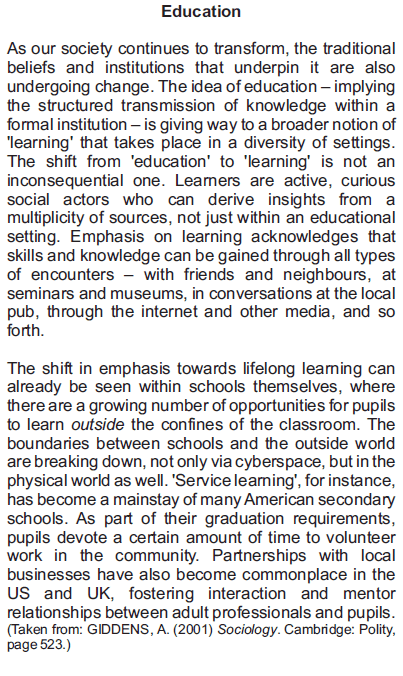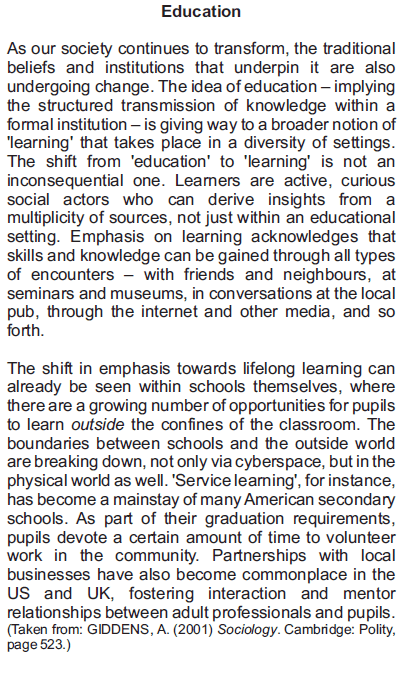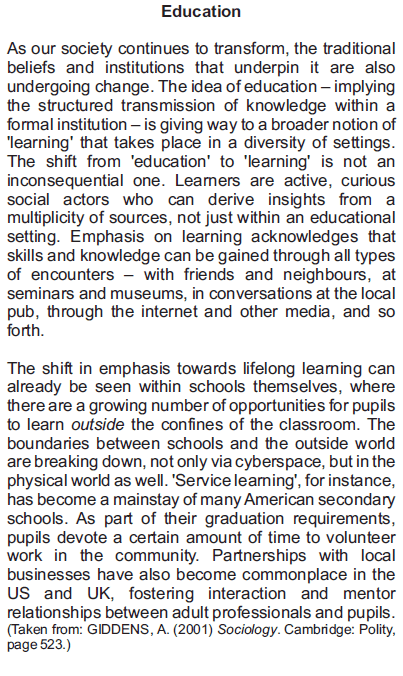Questões de Língua Inglesa do ano 2012
Lista completa de Questões de Língua Inglesa do ano 2012 para resolução totalmente grátis. Selecione os assuntos no filtro de questões e comece a resolver exercícios.
Língua Inglesa - Interpretação de Texto - Fundação para o Vestibular da Universidade Estadual Paulista (VUNESP) - 2012
Em cada uma das questões de números 46 a 60, reproduziu- -se trecho de uma breve conversa. Assinale a alternativa que apresenta a palavra ou expressão que preenche a lacuna corretamente.
How could you get to the hospital so fast?
Andrew insisted _____________ there in his motorcycle.- A.
on taking me
- B.
to take me
- C.
on me to take
- D.
me to take
- E.
that I took
Língua Inglesa - Interpretação de Texto - Fundação para o Vestibular da Universidade Estadual Paulista (VUNESP) - 2012
Em cada uma das questões de números 46 a 60, reproduziu- -se trecho de uma breve conversa. Assinale a alternativa que apresenta a palavra ou expressão que preenche a lacuna corretamente.
Dont you feel sorry for John?
His problem is no concern ______________ .- A.
of mine
- B.
myself
- C.
of me
- D.
me
- E.
of myself
Língua Inglesa - Interpretação de Texto - Fundação para o Vestibular da Universidade Estadual Paulista (VUNESP) - 2012
Em cada uma das questões de números 46 a 60, reproduziu- -se trecho de uma breve conversa. Assinale a alternativa que apresenta a palavra ou expressão que preenche a lacuna corretamente.
Are all the students here already?
Yes, everyone ______________ Peter.- A.
than
- B.
without
- C.
but
- D.
other
- E.
not
Língua Inglesa - Interpretação de Texto - Fundação Professor Carlos Augusto Bittencourt (FUNCAB) - 2012
Read the text below and answer the questions that follow.

Mark the alternative that best summarizes the main ideas of the text.
- A.
The shift from 'education' to 'learning' in our present time implied that learners have now no obligation to attend regular classes or do tests at school.
- B.
The shift in emphasis towards lifelong learning in our present society means that learners are now given opportunities to be trained to be world leaders.
- C.
The recent changes in our society have had little impact on the concept of education, but one must acknowledge that learners nowadays are a lot more active than in the last century.
- D.
Over the last decades social changes worldwide have determined the shift of focus of education to lifelong learning, implying that learning can take place in different kinds of situations inside and outside the confines of formal educational contexts.
- E.
Although there have been great changes in the world's society lately, the concept of education remains the same as in the past century, with the only difference that schools are now promoting visits to museums, internships in companies and Internet assignments.
Língua Inglesa - Interpretação de Texto - Fundação Professor Carlos Augusto Bittencourt (FUNCAB) - 2012
Read the text below and answer the questions that follow.

In [ ] that underpin it [ ] (first paragraph), the pronoun ITrefers to:
- A.
beliefs.
- B.
society.
- C.
change.
- D.
traditional.
- E.
education.
Língua Inglesa - Interpretação de Texto - Fundação Professor Carlos Augusto Bittencourt (FUNCAB) - 2012
Read the text below and answer the questions that follow.

In [ ] is not an inconsequential one. (first paragraph),ONErefers to:
- A.
shift.
- B.
learner.
- C.
learning.
- D.
education
- E.
inconsequential.
Língua Inglesa - Interpretação de Texto - Fundação Professor Carlos Augusto Bittencourt (FUNCAB) - 2012
Mark the alternative in which JUST has the same meaning as in the following sentence from the text: [ ] not just within an educational setting. (first paragraph):
- A.
It's just my size.
- B.
I've just arrived.
- C.
This is just a minor comment.
- D.
This hammer is just the thing I need.
- E.
Is this a just decision? I myself think he's guilty.
Língua Inglesa - Interpretação de Texto - Fundação Professor Carlos Augusto Bittencourt (FUNCAB) - 2012
Mark the alternative where the same rule for the ING ENDING applies as in [ ] the shift from education to learning [ ] (first paragraph):
- A.
[ ] there are a growing number [ ]
- B.
[ ] a broader notion of learning [ ]
- C.
[ ] within an educational setting [ ]
- D.
[ ] the boundaries are breaking down [ ]
- E.
[ ] the traditional beliefs and institutions [ ] are also undergoing change [ ]
Língua Inglesa - Interpretação de Texto - Fundação Professor Carlos Augusto Bittencourt (FUNCAB) - 2012
The commonly used reading strategies of SKIMMING and SCANNING for the teaching of English at school in Brazil correspond to, respectively:
- A.
deducing meaning of given words from context / reading between the lines.
- B.
reading between the lines / deducing meaning of given words from context.
- C.
reading for the general ideas / reading a text quickly to locate specific information.
- D.
reading a text superficially to locate specific information / reading for the general ideas.
- E.
reading for details / reading in order to find the correct order of scrambled paragraphs of a text.
Língua Inglesa - Interpretação de Texto - Fundação Professor Carlos Augusto Bittencourt (FUNCAB) - 2012
The reading technique of WORKING OUT THE MEANING OF WORDS OR SENTENCES FROM CONTEXTis known as:
- A.
scanning.
- B.
inference
- C.
skimming.
- D.
false cognate.
- E. cognate word.


